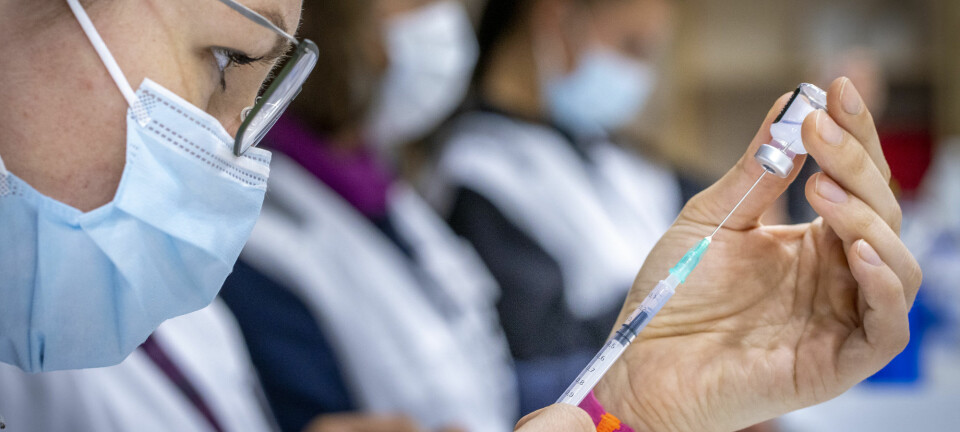
Norwegian Medicines Agency about Johnson & Johnson:
“We usually don’t use vaccines with lethal side effects”
Norwegian health authorities are working on establishing a volunteer scheme for those who wish to take the Johnson & Johnson vaccine outside of the national programme – but is it even legal?
The AstraZeneca and Johnson & Johnson adenoviral vector vaccines have both been removed from the coronavirus immunisation programme in Norway. However, the government has decided to offer the Johnson & Johnson vaccine to those who may wish to take it, despite warnings from health authorities and experts.
This appears to be easier said than done.
“We are trying to see if it is possible within todays legal framework to let people decide for themselves to have a vaccine – or whether the law actually demands that a doctor has evaluated the risk-benefit in advance”, Sigurd Hortemo says to newspaper VG (link in Norwegian). He is a senior medical consultant at the Norwegian Medicines Agency.
The Norwegian Medicines Agency is working with the health authorities to find out how to offer the vaccine. One survey done for a newspaper, found that one in five were positive to taking the vaccine.
As sciencenorway.no recently reported, the National Institute of Public Health and the Norwegian Directorate of Health do not advise people to get vaccinated with Johnson & Johnson. The Norwegian Medical Association has advised its members not to participate in administering the vaccine.
Hortemo says to VG that he believes there is no legal framework in Norway which allows people to waive risks and get vaccinated voluntarily.
“There may be a need for a legal change of some sort”, he says.
What role for the doctor?
If a drug is available over the counter, then the individual makes the decision on whether or not to take it. When given on prescription, a doctor has evaluated the risks and benefits for the patient.
Hortemo says the vaccine cannot be made available over the counter. But the Directorate of Health have at the same time said that doctors are not to evaluate the reasons for why somebody would like to get the vaccine – it’s supposed to be a “free for all”, where the doctor’s job is to merely provide information.
This information will include a recommendation to follow the national vaccination programme and wait for an mRNA vaccine.
The vaccines that are part of the national vaccination programme have already been evaluated by the National Institute of Public Health. Norwegians may say yes or no to a vaccine, and the doctor’s job is to make sure it is not given to somebody who for special reasons should not have it.
If a volunteer scheme is established for Johnson & Johnson, the Directorate of Health will be in charge of the guidelines, according to Hortemo.
Those who chose to get vaccinated outside of the national programme would still be included in The Norwegian System of Patient Injury Compensation.
Less risky to wait for an mRNA vaccine
The AstraZeneca vaccine was paused in Norway on March 11 after reports of rare and serious side effects. An expert group which evaluated so-called adenoviral vector vaccines recommended in May that Norway remove both the AstraZeneca and the Johnson & Johnson vaccines from the national programme.
Norway has observed eight cases of the potentially lethal blood clotting side effects following vaccination with AstraZeneca. Four previously healthy individuals died. This gives a prevalence in Norway of 1 out of 17 000. The corresponding figure for Johnson & Johnson is 1 in 100 000. This figure is, however, based on uncertain numbers as the vaccine has been given to among others homeless people in the USA as well as other groups of people that are difficult to monitor.
The rare side effects have been seen also following vaccination with Johnson & Johnson.
“We still do not know how often this happens, but it is not unthinkable that the risk may be on the same level as the vaccine from AstraZeneca”, Hortemo says to VG.
Given the low levels of infection rates in Norway at the moment, and the availability of mRNA vaccines, the National Institute of Public Health have said that for women in Norway aged 18-50, it would be more risky to get vaccinated with the Johnson & Johnson vaccine, compared to waiting for an mRNA shot.
Unchartered waters
According to Hortemo, legally speaking this is unchartered waters.
“This is something completely new, because we usually do not use vaccines with lethal side effects. One exception is the vaccine against yellow fever which in rare cases may cause death”, he says to VG.
So what then, if the Johnson & Johnson vaccine were to cause another case of rare blood clots and bleedings in Norway?
“This is difficult to assess, and an interesting question. What will it take for us to press the red button one more time?”, Hortemo asks.
The Medicines Agency will not remove the approval of the vaccine unless the rare blood clotting condition appears, he says.
“Johnson & Johnson is approved in all of the EU, but with an important caveat – that it be used in accordance with national recommendations. Even if the vaccine is not recommended in Norway, this assessment may differ in a country with high levels of transmission”, Hortemo says.
Denmark’s volunteer scheme for Johnson & Johnson is already in place, and the first danes received their shots Thursday this week, according to Berlingske (link in Danish). The newspaper writes that 126 men and 26 women got the vaccine on that first day in Copehagen.


































